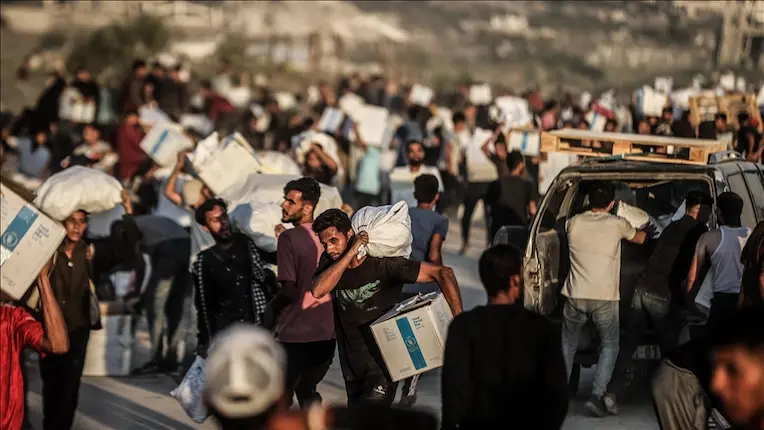
Oxycodone-laced flour bags and deadly Israeli airstrikes have plunged Gaza into deeper crisis.
Poisoned Relief: Oxycodone Found in Gaza Aid Sparks Outrage
Aid or Ambush? – In a revelation that has stunned aid workers and civilians alike, oxycodone pills were reportedly discovered inside flour bags distributed as humanitarian aid in Gaza. The Gaza government media office, along with multiple eyewitnesses, confirmed the presence of the powerful opioid in food supplies meant for starving families. The discovery has triggered widespread alarm, raising questions about the integrity of aid channels and the potential for psychological warfare.
The flour bags were part of shipments distributed through the Gaza Humanitarian Foundation (GHF), a controversial aid mechanism backed by the U.S. and Israel. While the GHF has denied any wrongdoing, the incident has intensified scrutiny over its operations, which have already been criticized for chaotic distribution, lack of transparency, and deadly crowd control measures.
Medical experts warn that oxycodone, a narcotic painkiller, can cause respiratory depression, unconsciousness, and death if consumed unknowingly especially by children or the elderly. The implications are chilling: whether accidental or deliberate, the contamination of food aid with such a substance could amount to a violation of international humanitarian law.
The United Nations and Doctors Without Borders (MSF) have called for an independent investigation, demanding full access to aid supply chains and forensic testing of distributed goods. Meanwhile, panic has spread among Gaza’s population, with many now afraid to consume the very aid they desperately need to survive.
Death from Above: Israeli Strikes Kill Dozens as Nasser Hospital Faces Siege
While the aid scandal unfolds, Israeli military operations have intensified, with at least 34 Palestinians killed in a series of airstrikes across Gaza in the past 24 hours. The strikes reportedly targeted residential areas, aid distribution centers, and even medical facilities. Among the most alarming developments is the siege of Nasser Hospital in southern Gaza, one of the last functioning medical complexes in the region.
Eyewitnesses describe scenes of chaos as ambulances were blocked, patients were trapped inside, and medical staff were forced to operate under fire. The World Health Organization has condemned the targeting of healthcare infrastructure, warning that only 19 of Gaza’s 36 hospitals remain operational, many of them barely functional due to fuel shortages, damaged equipment, and staff exhaustion.
The siege of Nasser Hospital is emblematic of a broader collapse of Gaza’s health system. With over 56,000 deaths reported since the conflict reignited in October 2023, and thousands more injured, the region’s medical capacity is stretched beyond breaking point. The systematic targeting of hospitals, according to WHO, is not only a humanitarian catastrophe but also a potential war crime.
Israel maintains that its strikes are aimed at Hamas militants and infrastructure, but human rights organizations argue that the civilian toll is disproportionately high, with over 60% of attacks reportedly affecting non-combatants.
A Crisis of Trust: Aid, Ethics, and the Future of Humanitarian Access
The dual crises, tainted aid and relentless bombardment, have created a perfect storm of fear, mistrust, and despair in Gaza. The Gaza Humanitarian Foundation, which replaced UN-led aid distribution, has come under fire for its militarized delivery model, limited access points, and alleged coordination with Israeli forces. Critics argue that the system not only fails to meet humanitarian needs but also endangers civilians by forcing them into conflict zones to access food.
The discovery of drugs in aid packages has further eroded public confidence. Many Gazans now view the aid not as a lifeline, but as a potential threat. “We are being starved, bombed, and now poisoned,” said one resident of Khan Younis. “What kind of world allows this?”
International bodies, including the UN and Red Cross, have called for the restoration of neutral, UN-led aid channels, citing the need for transparency, accountability, and safety. Meanwhile, the Indian government and other nations with citizens in Gaza have issued travel advisories and called for immediate ceasefires to allow humanitarian corridors.
Stay updated with the latest news on Rapido Updates. Keep yourself updated with The World, India News, Entertainment, Market, Automobile, Gadgets, Sports, and many more